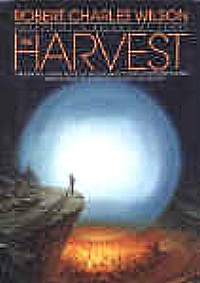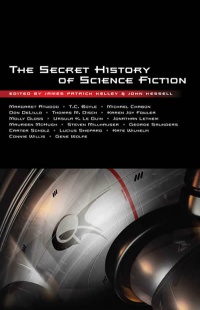It was the same dream for everyone. The dream was complex, but the dream in its most fundamental form was a single thought, a question posed in six billion human skulls and more than three thousand languages.
The question was: Do you want to live?
Title: The Harvest
Author: Robert Charles Wilson
Year: 1992
Rating: 3 out of 5 stars
 As with most of Wilson’s other novels, this one is built upon a bold and compelling premise: what happens when aliens show up and offer us immortality? Some authors might use that premise as an intro to deception and alien invasion, but Wilson takes the idea at face value and treats it seriously. The offer is sincere and the immortality is real. The book is an exploration of humanity’s reaction to such an offer, and the changes that ensue. More specifically, it’s about those few people who turn down the offer, and how they deal with their decision in a vastly altered world.
As with most of Wilson’s other novels, this one is built upon a bold and compelling premise: what happens when aliens show up and offer us immortality? Some authors might use that premise as an intro to deception and alien invasion, but Wilson takes the idea at face value and treats it seriously. The offer is sincere and the immortality is real. The book is an exploration of humanity’s reaction to such an offer, and the changes that ensue. More specifically, it’s about those few people who turn down the offer, and how they deal with their decision in a vastly altered world.
After orbiting the Earth for a year, the Travelers decide to bestow a gift upon its inhabitants. On the day that comes to be known as Contact, every man, woman, and child is given a choice: to remain as they are, or to become like the Travelers, creatures with indefinite lifespans, roaming the galaxy in exploration. There are no strings attached to the offer; nothing is held back, and the extent of the change is made clear to everyone up front:
Do you want to live, they had asked, even if you change? Even if you become, in time, something no longer entirely human?
The vast majority of humanity accepts the offer; after all, it’s hard to turn down immortality. But approximately one in ten thousand do turn it down, for a variety of reasons. The novel revolves around a group of such people, lingering behind in a world being deserted. There’s John Tyler, a not-quite-sane Army colonel whose paranoia forces him to see events through the lens of invasion, and to do whatever he can to fight back. Joey Commoner is a rebellious youth with the word “worthless” tattooed on his arm; he doesn’t know if he deserves immortality, but even so, if everyone else wants it, then count him out. Miriam Flett is an old woman who has lived a life of faith, and who sees these changes as a test of that faith and/or a ploy of Satan. Tom Kindle is a hermit, a cantankerous old coot who doesn’t care for the company of others; the disembodied communal life of the Travelers appeals to him not one bit.
There are others, too, but the central character is Matt Wheeler, a small-town doctor whose decision to remain human will separate him forever from his teenage daughter. At first Matt’s motivations are not clear, and I don’t think he himself could put them into words. However, as he has more time to think about it, he figures out why he said no to the Travelers. He simply can’t bring himself to give up his humanity, and part of being human is coming to terms with the human condition:
What they had given up was something more subtle. It had taken Matt most of his life to learn to live in a world where everything he loved was liable to vanish — and he had never loved that vanishing. But he had learned to endure in spite of it. He had made a contract with it. You don’t stint your love even if the people you love grow old or grow apart. You save a life, when you can, even though everyone dies. There was nothing to be gained by holding back. Seize the day; there is no other reward.
Such perceptive insights into the human spirit form much of the strength of this novel, something that will come as no surprise to those familiar with Wilson’s work. He can do more to develop a character in a few paragraphs than some authors can do in a whole chapter (or even book!). Add to that his boldly imaginative story ideas, and it’s no wonder he’s one of my very favorite writers.














